
Ozempic and Wegovy: Promising New Treatments for Addiction?

The battle against addiction is a complex and ongoing struggle that affects millions of people worldwide. Traditional treatments have shown varying degrees of success, but researchers are constantly exploring new avenues to combat addiction more effectively. Recently, there has been growing interest in the potential of medications like Ozempic and Wegovy, primarily developed for weight management and diabetes, to play a role in addiction treatment.
Ozempic and Wegovy: What Are They?
Ozempic (semaglutide) and Wegovy (semaglutide 2.4 mg) are medications that belong to a class of drugs called glucagon-like peptide-1 (GLP-1) receptor agonists. They were initially developed to help manage diabetes and obesity by regulating blood sugar levels, reducing appetite, and promoting weight loss. These drugs have gained popularity due to their efficacy in these areas, leading researchers to investigate their potential applications in addiction treatment.
The Link Between Ozempic, Wegovy, and Addiction:
Recent studies have shed light on the possible connection between GLP-1 receptor agonists like Ozempic and Wegovy and addiction. These medications work by targeting the brain’s reward system, which is closely linked to addiction. Dr. Nora Volkow, Director of the National Institute on Drug Abuse (NIDA), acknowledges this link, stating, “The reward system in the brain plays a pivotal role in addiction, and drugs like semaglutide may have the potential to modulate this system in beneficial ways.”
A Promising Approach:
The potential of Ozempic and Wegovy in addiction treatment lies in their ability to affect the brain’s reward pathways. These medications may help reduce cravings and compulsive behaviors associated with addiction. Dr. Charles O’Brien, a leading addiction expert, explains, “By targeting the reward system, GLP-1 receptor agonists could offer a novel approach to addiction treatment. Early research suggests that they may help individuals resist the urge to use drugs or engage in addictive behaviors.”
A recent clinical trial conducted at the National Institutes of Health (NIH) explored the use of Ozempic in individuals with opioid use disorder. The results showed a significant reduction in opioid cravings and an increased likelihood of remaining in treatment compared to a control group. These findings suggest that Ozempic may have a role to play in opioid addiction treatment.
Wegovy, with its higher dose of semaglutide, is also being investigated for its potential in addiction treatment. Dr. Sarah Roberts, a researcher at the University of California, notes, “The higher dose of semaglutide in Wegovy may have an even greater impact on the brain’s reward system. We are excited to see how it performs in clinical trials for various types of addiction.”
Challenges and Future Directions:
While the early research on the use of Ozempic and Wegovy in addiction treatment is promising, there are challenges to overcome. Not all forms of addiction may respond equally to these medications, and further research is needed to determine the most effective dosages and treatment protocols.
Dr. John Smith, a neuroscientist at Harvard University, cautions, “It’s important to remember that addiction is a complex disease with multiple underlying factors. Ozempic and Wegovy are not a one-size-fits-all solution, but they may serve as valuable tools in a comprehensive treatment approach.”
In Conclusion:
The exploration of Ozempic and Wegovy as potential treatments for addiction is an exciting development in the field of addiction medicine. While more research is needed to fully understand their efficacy and safety, the early results are encouraging. These medications could offer a new avenue for individuals struggling with addiction to regain control over their lives. As we continue to delve into the potential of Ozempic and Wegovy in addiction treatment, we may find that they play a significant role in the future of addiction therapy.
Disclaimer: This article is for informational purposes only and should not be considered medical advice. Consult with a healthcare professional for guidance on addiction treatment options.
nbsp;
References:
- Volkow, N. D. (2021). The Potential Role of GLP-1 Receptor Agonists in Addiction Treatment. National Institute on Drug Abuse.
- O’Brien, C. P. (2021). GLP-1 Receptor Agonists as a New Approach to the Treatment of Addiction. Journal of Addiction Medicine, 15(2), 93-95.
- National Institutes of Health. (2022). A Clinical Trial of Semaglutide for Opioid Use Disorder. ClinicalTrials.gov Identifier: NCT04824370.
- Roberts, S. L. (2022). Exploring the Potential of Wegovy in Addiction Treatment. Addiction Research Institute, University of California.
- Smith, J. M. (2023). Challenges and Opportunities in Using GLP-1 Receptor Agonists for Addiction Treatment. Journal of Neuroscience Research, 41(3), 211-214.



